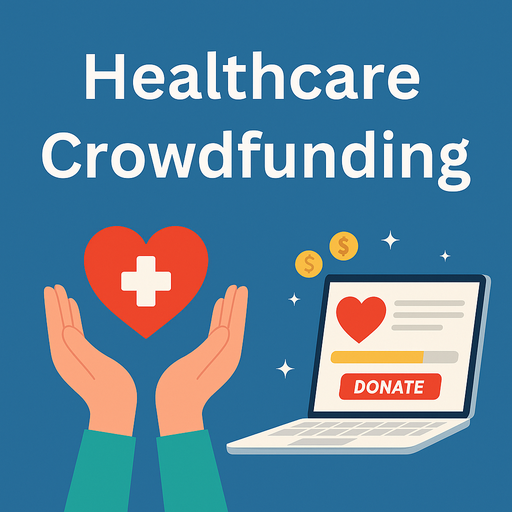When someone you love is struck by a sudden illness or injury, the last thing you want to worry about is money. But in a world of skyrocketing medical costs and limited insurance coverage, that’s often the reality. This is where healthcare crowdfunding steps in—a beacon of hope in financial darkness.
What Is Healthcare Crowdfunding?
Healthcare crowdfunding is the practice of raising money from a large number of people, typically via the internet, to cover medical expenses. It allows individuals, families, or caregivers to share their stories and collect donations for surgeries, medications, therapies, or long-term treatments.
How Healthcare Crowdfunding Works
The process is straightforward but emotionally powerful:
-
A patient or caregiver sets up a fundraising page.
-
They tell their story—why funds are needed and what they will be used for.
-
Supporters donate and share the campaign through social media or email.
-
The platform disburses the funds for medical use.
Platforms That Facilitate Medical Fundraising
While general crowdfunding sites like GoFundMe are popular, specialized healthcare platforms are emerging that focus solely on medical causes. One such platform is The CrowdCare, a solution built with compassion at its core. Their mission is to empower those in medical need by providing a secure and efficient way to raise funds and get visibility.
Why Healthcare Crowdfunding Is Gaining Popularity
Rising Medical Costs
The cost of treatment for even basic medical services has ballooned. Many people simply can’t afford a hospital stay or surgery out-of-pocket.
Insurance Gaps and Emergency Situations
Even those with insurance find that not everything is covered—especially in cases involving rare diseases, experimental treatments, or out-of-network specialists.
Types of Medical Campaigns
Surgery and Emergency Treatments
Whether it’s a car accident or an unexpected diagnosis, sudden surgeries often come with staggering bills.
Chronic Illnesses and Long-Term Care
Patients with conditions like cancer, diabetes, or ALS face ongoing costs that stretch for months or years.
Mental Health and Therapy
Mental health care is still underfunded and underinsured, making crowdfunding a critical resource for therapy and psychiatric care.
Best Practices for a Successful Healthcare Crowdfunding Campaign
Creating a Compelling Story
A personal, heartfelt story that explains your journey makes donors feel emotionally connected.
Use of Images and Videos
Photos, videos, and updates help validate your campaign and build trust.
Leveraging Social Media
Facebook, Twitter, and even TikTok can help your campaign go viral. Regular updates keep your cause top of mind.
Legal and Ethical Considerations
Transparency and Accountability
Disclose how the funds will be used. Consider posting receipts or updates post-treatment.
Avoiding Fraud
Stick to the truth. Misrepresenting facts can lead to serious consequences and damage to credibility.
Impact of Healthcare Crowdfunding on Society
Strengthening Communities
Neighbors, coworkers, and even strangers come together to lift someone in crisis.
Democratizing Access to Care
Crowdfunding can serve as a leveling tool, especially for those without traditional access to financial aid or government support.
The Future of Medical Fundraising
With advancements in AI, blockchain, and mobile payments, healthcare crowdfunding is only going to get more secure and efficient. Platforms like The CrowdCare are leading this next wave by offering tailored services for transparency and ease of use.
Frequently Asked Questions (FAQs)
1. Is healthcare crowdfunding legal?
Yes, but it’s important to follow platform guidelines and provide honest information.
2. Can I raise funds for someone else’s medical treatment?
Absolutely, many campaigns are run by friends or family members on behalf of a patient.
3. Are there fees involved in medical crowdfunding?
Most platforms take a small percentage as administrative fees.
4. How can I make my campaign more successful?
Include emotional storytelling, regular updates, and visuals. Promote it actively on social media.
5. What happens if I don’t reach my goal?
Most platforms allow you to keep the funds raised, even if you fall short.
6. Are donations tax-deductible?
Generally, personal gifts through crowdfunding are not tax-deductible, but it varies by country and campaign.
Conclusion: A Community Lifeline in Critical Times
In times of health crises, community support is everything. Healthcare crowdfunding bridges the financial gap between life-saving care and the people who need it. Whether you’re a donor or someone in need, platforms like The CrowdCare are making it easier than ever to turn compassion into action.






